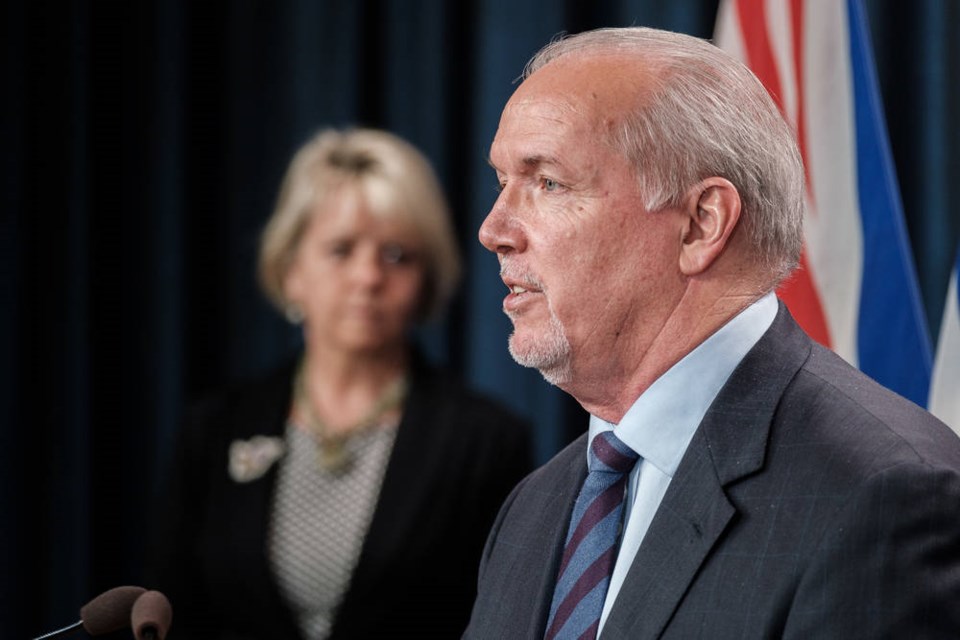B.C. Premier John Horgan has announced a suite of restrictions on travel including bookings for recreational vehicles on ferries, going outside your health authority region, and non-essential movement between provinces.
“We are at the end of the most extraordinary of years, but we are not through it yet,” Horgan said.
The province reported 2,960 COVID-19 cases over the weekend, including 108 in Island Health.
As of Monday, there were 9,353 active cases of COVID-19 in the province and 441 people in hospital, including 138 in intensive care with the virus, a record high. Almost 15,000 people have been exposed and are being monitored.
There were eight new deaths related to COVID-19, including a toddler younger than two years old. It’s the youngest COVID-19 related death in the province. The child in the Fraser Health Authority had pre-existing conditions and was receiving specialized care at B.C. Children’s Hospital “but it was the virus that caused their death,” said provincial health officer Dr. Bonnie Henry. “It’s a true tragedy and it’s a reflection of the impact that this virus is having on our communities.”
On Friday, Public Safety and Solicitor General Mike Farnworth will issue orders to restrict people’s ability to leave their health authority.
“This will be conducted through random audits, not unlike roadside stops for CounterAttack during the Christmas season,” Horgan said.
Those travelling outside of their health authority without a legitimate reason will be fined.
“This is about travel, there will be no additional authority given to police,” Horgan said. “This will be a random audit to ensure people are following the guidelines.”
He said most British Columbians are following the rules and the strengthened restrictions are for those “that are not listening, or not paying attention, and putting their fellow members of the community at risk.”
Henry said variants are more transmissible and “we’re seeing more of those” and travel is spreading the virus between regions. Indoor transmission is the largest risk, but “we are concerned that you can spread COVID-19 outside, particularly the [U.K.] B 1.1.7; we’ve seen that in some areas.”
Travelling within a health authority does not mean people from Victoria should be travelling to stay overnight in Tofino, or that people in Vancouver should be travelling to Whistler. “We’re again asking people to use common sense … staying close to home,” said Horgan.
B.C. will erect signs along the Alberta border, reminding travelers coming from outside the province “that unless they’re coming for essential business, they should not be here.” Provinces including Ontario and Quebec are also telling their citizens to stay home.
Tourism operators have agreed to not take out-of-province or out-of-health-authority bookings for overnight stays for non-essential travel.
“This is not the time to load up the Winnebago and travel around British Columbia,” Horgan said. “If you live in the Fraser Health area, by all means, take a few days, get outside, perhaps go to a campground in your local area. But do not try and book somewhere outside of your area, because the tourism operator in that community will not book you passage.”
B.C. Ferries will stop accepting bookings for recreational vehicles such as campers and trailers at the end of the week. The corporation will contact passengers with reservations to make sure that their travel is essential.
The province extended its “circuit breaker” restricting indoor gatherings in restaurants and pubs, places of worship, and fitness clubs for at least five weeks, until the end of the Victoria Day long weekend.
The ongoing restrictions are aimed at “avoiding overwhelming our health care system,” said B.C. Health Minister Adrian Dix. Two areas of concern are growing COVID-19 hospitalizations and how that will impact all other hospital care — deferral of surgeries, for example.
Government assistance programs put in place to help businesses through these restrictions will be extended, Horgan said.
Restrictions introduced March 29 are bending the COVID-19 transmission curve slightly but have not stopped record-high daily case counts, active case counts, hospitalizations and intensive care unit admissions.
Henry said B.C. remains in a very challenging situation, with increases in the number of people in hospital and critical care beds, and on ventilators over the past month.
“What’s happening in hospitals is always affected by what all of us do in communities,” said Dix. “We all have to take action to reduce transmission of COVID-19.”
Hospitalized cases are up among 20 to 29 year olds but the most noticeable increase has been in men 50 to 59 years old and women 55-59 years old.
“Compared to January and compared to last April, the COVID-19 situation in our hospital is significantly more challenging,” Dix said.
Island Health, with three COVID‑19 designated hospitals including Royal Jubilee Hospital, is not experiencing the same degree of pressure as health authorities elsewhere in the province.



